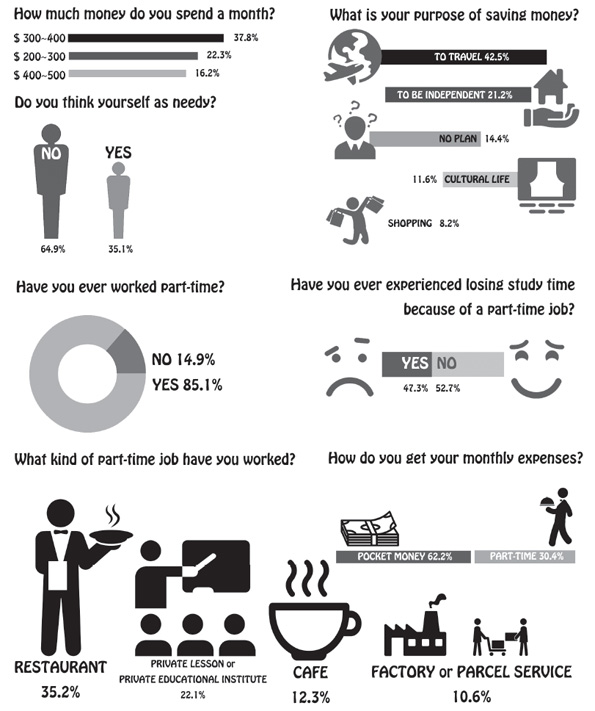Korea underwent the IMF crisis which caused a big increase in the unemployment rate in 1997. This IMF crisis caused that generation to be coined the Kangaroo Generation. Since the placenta of a kangaroo is not well developed, the mother kangaroo keeps her babies in a tummy pouch to feed and raise them for about 9 months. Therefore, the term Kangaroo Generation refers to grown-up children who still are financially dependent on their parents. The similar term, NEET(Not in Education, Employment or Training) appeared during the 1990s. NEET indicates unemployed young people who have no will to work.
According to a survey targeting 3,574 adult males and females on the online job-search site Job Korea, 43% of Koreans in their twenties designated themselves as Kangaroo Generation. Moreover, the percentage of the Korean NEET who graduated from a university and are aged between 15~29 ranked 3rd among OECD countries in December, 2015.
People commonly describe modern society with keywords such as a high rate of inflation and low minimum wages, and they form a conclusion that living in Korea itself is extremely hard. However, lots of surveys showed that the lives of university students are not always hard. The average monthly living expenses of university students who live with their parents is about 360 dollars, and those who live alone spend 490 dollars. Meanwhile, their average monthly pocket money is about 225 dollars, which accounts for 61% of expenses.
A survey of 148 people conducted by CBT got an analogous conclusion. Students’ monthly expenses are 300~400 dollars(37.8%), and the majority of them have experienced working part-time(85.1%). Many students have worked in restaurants(35.2%), but they don’t consider themselves needy(64.9%) since they mostly obtain money from parents(62.2%). People who said they have experienced losing study time because of a part-time job is less than half(47.3%), and students want to travel(42.5%) if they earn enough money rather than achieve financial independence(21.2%). (Refer to an infographic at the upper side)
It is not completely the fault of students that they lack the spirit of independence; Korean society certainly makes the youths’ lives tough. The Korea Labor and Society Institute found out that while 12.4% of all workers receive pay that is below minimum wages, 28.4% of people aged under 25 and even 36.6% of university students also do so. Besides, working for 8 hours a day is almost impossible for students because they devote 8.3 hours a day and 100 dollars a month to acquire better qualifications for future jobs.
Is there no way for university students to be independent? The minimum wage in 2016 is 6,030 won. Supposing students worked 5 hours a day during the semester except for the weekends, they would earn 150 dollars a week and 670 dollars a month. This amount of money surpasses the average expenses students use, 300~400 dollars.
Furthermore, CBNU’s reception rate of scholarships is about 50%, which is comparatively high, and you can find various kinds of scholarships outside the school. There’s no need to worry about tuition fees if you concentrate on studying, which is the day job for all students. Those who have thought that working part-time is wasting time can find other ways not only to earn money but also to help themselves. Labor scholarship students can earn money in school, and many school activities and extracurricular activities provide enough money. For instance, transportation fees to other cities such as Seoul are generally refunded, and the costs of materials and meetings are given, so students aren’t burdened.
The young generation, recently, is defined by the term N-po Generation(‘po’ means giving up. N-po means giving up a number of things). The youth should give up having romantic relationships, getting married and having babies. There’s also the Hierarchical Theory of Spoons which classifies them into spoons such as soil, bronze, and gold spoons. People have gradually become lethargic and bereft of hope saying that they can never achieve their goals no matter how hard they try. The advertising phrase of the S card in 2015, “I don’t want to do anything. Even though I’m not doing anything, I want to do nothing more intensely,” was popular. The reason for its popularity was that this quotation represented the feelings of the young people.
However, if you constantly endeavor, you can enjoy a university life that you dreamt of. Rather than having irresponsible complaints, it would be better for you to look back on yourself if you were lazy and idle but then converted your attitude into a diligently working condition.
By Lee Sang-yi
sy36@cbnu.ac.kr


 All
All Campus News
Campus News






 Lee Sang-yi
Lee Sang-yi











